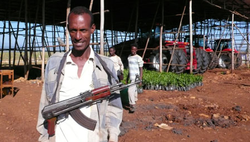Bloomberg | 4 May 2010
By William Davison
Ethiopia slashed the size of Karuturi Global Ltd. (KARG)’s land concession that was larger than Luxembourg on concern it was too big for a single company to manage and to enable an annual migration of antelope, the government said.
The amendment, which reduced the concession by two-thirds to 100,000 hectares (247,105 acres), was made in consultation with Bangalore-based Karuturi six months ago, Esayas Kebede, head of the Agriculture Ministry’s land investment support directorate, said in an interview in Addis Ababa, the capital. Karuturi’s website lists its concession at 311,000 hectares.
“We have not received any recent updates on the Karuturi agricultural business in Ethiopia,” said Archit Singh, an analyst at Globe Capital Market Ltd., which has a “strong buy” rating on the company’s stock. “I am not aware of any change in the lease size,” he said by phone from New Delhi yesterday.
Ethiopia, the country that came to symbolize Africa’s inability to feed itself in the 1980s, has transferred about 350,000 hectares of agricultural land in the Gambella, Benishangul-Gumuz and Southern Nations regions since September 2009, according to the Agriculture Ministry’s website. Investors include companies from Ethiopia, India, China, Saudi Arabia as well as Ethiopians living abroad.
Chief Executive Officer Ramakrishna Karuturi declined to comment on the amendment in an e-mailed response to questions on April 29. Esayas didn’t say when the change was made public.
Karuturi shares fell 2.4 percent to 12.25 rupees today. The stock has dropped 47 percent so far this year.
‘Huge Area’
“Three hundred thousand hectares is a huge area of land. Nobody can manage it,” Esayas said on April 29. “Therefore, Karuturi should get a rational and manageable plot of land based on its own capacity and our monitoring and evaluation capacity.”
Karuturi, which has invested $100 million in Ethiopia so far, plans to have 65,000 hectares in production this year and sell its first harvest in October mainly within Ethiopia and to other East African nations, Karuturi said in an e-mailed statement in February. The company is growing crops including rice, palm oil, sugar cane and cereals.
The boundary of Karuturi’s land wasn’t accurately mapped when it was first leased by the Gambella Regional Government in 2009, Esayas said. All similar land deals are now handled by the directorate in the Agriculture Ministry, he said.
“They signed an agreement without any coordinates or delineation of the land,” he said. “As a federal government, we should correct that mistake.”
White-Eared Kob
Part of the reason for the amendment to the concession was to create an 8,000-hectare corridor through Karuturi’s land for a one-million strong migration of white-eared kob, a type of antelope, Esayas said.
The annual movement from Southern Sudan into an area that includes Gambella National Park, which was given a new boundary in March, is the second-largest mammal migration in Africa, Cherie Enawgaw, an ecologist at the Ethiopian Wildlife Conservation Authority, said in a phone interview from Arba Minch in southern Ethiopia on May 2.
Among other investors in Ethiopian land are Hunan Dafengyuan Agriculture Co., a Chinese company, which is developing 25,000 hectares to grow sugar cane in Gambella, a fertile state with a relatively low population density, according to the ministry. Spentex Industries Ltd. (SPTI), a Delhi- based yarnmaker, is growing cotton in the northwestern region of Benishangul-Gumuz, also on 25,000 hectares, it said. Shapoorji Pallonji & Co. of India has 50,000 hectares to grow biofuels in the same region.
Almost all rental fees range from 30 birr ($1.76) to 158 birr per hectare a year, according to the Agriculture Ministry.
Criticism
Critics of Ethiopia’s land policy, including GRAIN, the Barcelona-based advocacy group, have argued that domestic farmers are being dispossessed and the country shouldn’t rent land cheaply to foreign investors to grow cash crops when about 13 percent of its approximately 80 million people still rely on food aid.
Ethiopia is prepared to lease 3.6 million hectares of an available 74.5 million hectares of suitable land if it gets “real investment,” Esayas said. The government of Africa’s second-most populous nation, which bars private land ownership, says the investments will provide technology, jobs, improved food security and export revenue.
Major investors may receive more land if performance evaluations, which are done monthly, meet the ministry’s requirements, according to Esayas.
To contact the reporter on this story: William Davison in Addis Ababa via Nairobi at [email protected].
To contact the editor responsible for this story: Paul Richardson in Nairobi at [email protected].














